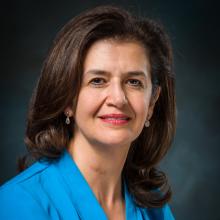Empathy and Empowerment: Values to Navigate the Intersection of World Events and Education

As I reflect on 2022, I acknowledge that it was a year when the COVID-19 pandemic took a “back seat” to continually unfolding global conflict and tragedies. The headlines in 2022 were dominated by the concerns and issues around climate change, geopolitical polarity in the United States and abroad, and the unfolding of many often, tragic events. These events include and are by no means limited to: the Russian invasion of Ukraine; the devastating floods in Pakistan and Sri Lanka, resulting in severe economic crisis; the political unrest in Iran triggered by the death of Mahsa Amini. The list goes on.
This past year has provided me with ample opportunity to reflect personally and professionally. On an individual level, I know that my life experiences continue to contribute to my genuine passion for the field of international education and to foster the sense of empathy which is a significant trait for any international educator. As an Iranian-American woman, those emotions have been intensely triggered these past few months by the human rights atrocities taking place in Iran. On a daily basis, I consider ways to help promote and amplify the voices of the Iranian girls, women, and men and to advocate for their quest for freedom, liberty, and peace.
The Critical Role of Faculty in Promoting Global Learning Opportunities
The intersection of world events and education is real and here to stay, was made all the more clear to me in 2022. This bridge between education and international relations is of importance for anyone seeking to understand the ways in which internationalization and global learning impact student success. I was also able to deepen my understanding of the importance of our work in helping students and faculty develop and strengthen their sense of empathy, critical in building bridges and learning to see situations from a multi-lens perspective.
As a result of the increased and undeniable interconnectedness of the world, the 21st century classroom must encompass intentional goals to increase students’ global awareness. The critical role of faculty in this endeavor is undeniable. Faculty continue to impact the teaching, research, and service of an institution. More specifically, faculty in higher education institutions can promote broad thinking beyond physical borders.
For example, we know that our faculty have the power to integrate the intercultural and international components into their curriculum and more importantly, to infuse the broader global perspective into their classroom environment. The pandemic offered faculty the opportunity to become more innovative in this regard as they pivoted to offer these global learning experiences in multiple modalities (e.g., virtual, hybrid and in-person).
We know that many faculty are organically involved in academic and research collaborations with scholars from all around the world. In order to be successful at infusing the intercultural elements into their teaching and research, the faculty themselves need to be trained and exposed to the important value of international collaborations and the strength of teaching through an intercultural lens. As such, each institution needs to feel responsible to provide professional development opportunities for faculty as an acknowledgement of the importance and prioritization of developing intercultural competence and engaging in international opportunities.
The Interconnectedness Faculty and Administrators in This Endeavor
In order to achieve these goals, each HEI needs a commitment from administrators, more specifically from senior leadership to work alongside faculty to achieve these goals. Therefore, faculty and administrators must work together as partners in the pursuit of instilling empathy and fostering humanizing and relational skills. These goals are required for success in the 21st century classroom, workplace, and community. In other words, faculty must recognize the expertise of administrators to guide them in this endeavor and administrators must recognize the incredible power of faculty to bring about change through their teaching, research, and service and to impact the future of global education.
We can embark on this path by identifying faculty champions, who are willing to combine their efforts with that of administrators. As a result, in partnership they can help pave the way to promote the concept of global citizenship with the goal of instilling an awareness and understanding of the global landscape for all students.
That being said, many challenges remain. With many transitions happening in senior leadership positions in HEIs in the United States today, having that supportive voice and advocacy is not constant nor consistent. However, the hope is that those remaining within an institution will utilize their strategic thinking skills to think of ways to continue to foster these relationships and to continue to align forces to promote the importance of global learning for all students as a means of developing the right skills to succeed as leaders in the modern global landscape.
Empathy and Empowerment
So, when I think back to 2022 and reflect ahead to 2023, what continues to define my work as an international educator is my personal motivation to help students understand the world around them, to see things from a different perspective and most importantly, to have empathy and the drive to advocate and fight for justice, freedom, and peace. In my professional journey as an administrator, I will continue to aspire to empower faculty to understand their power in infusing the intercultural as part of the diversity and inclusion goals in their teaching, research, and service, which is critical in creating global perspectives and grooming the mindset of global citizenship.
I am confident that with perseverance we can create a path to worldwide tolerance, greater understanding, and ultimately, albeit idealistically, strive for world peace. •
Parinaz Zartoshty, EdD, is the director of international student and scholar services and interim director of study abroad and away at San José State University's College of Professional and Global Education.
About International Educator
International Educator is NAFSA’s flagship publication and has been published continually since 1990. As a record of the association and the field of international education, IE includes articles on a variety of topics, trends, and issues facing NAFSA members and their work.
From in-depth features to interviews with thought leaders and columns tailored to NAFSA’s knowledge communities, IE provides must-read context and analysis to those working around the globe to advance international education and exchange.
About NAFSA
NAFSA: Association of International Educators is the world's largest nonprofit association dedicated to international education and exchange. NAFSA serves the needs of more than 10,000 members and international educators worldwide at more than 3,500 institutions, in over 150 countries.
NAFSA membership provides you with unmatched access to best-in-class programs, critical updates, and resources to professionalize your practice. Members gain unrivaled opportunities to partner with experienced international education leaders.















